Special ReportWhat it’s really like to be Jewish on a campus ‘hotspot’ of antisemitism
A year at George Washington University shows what is often missed by national groups sounding the alarm over the safety of Jewish students
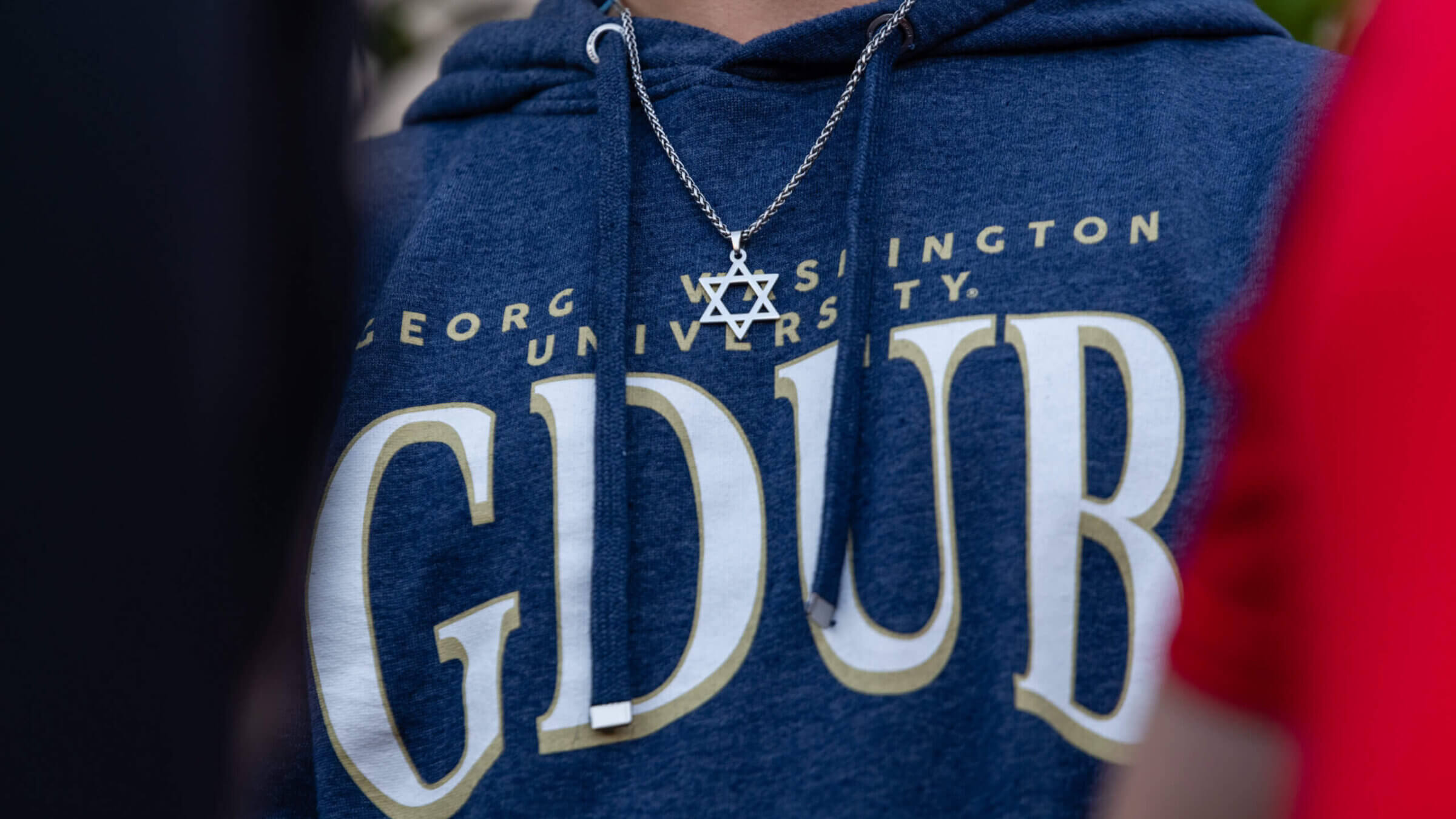
A student attends a campus vigil against antisemitism last November after a replica Torah was vandalized. Photo by Eric Lee for the Forward
The first reports from George Washington University last October were alarming: Someone had broken into a fraternity house and desecrated a Torah — tearing the scroll and dousing it with laundry detergent. The story spread like wildfire online; hundreds joined a campus vigil against antisemitism.
“The status quo, where Jewish students at this campus are fearing for their lives, has existed for far too long,” declared the fraternity president, Chris Osborne, choking up as he spoke.
Many Jewish students found the assertion exaggerated. The incident was upsetting, but hardly life-threatening: The “Torah” in question turned out to be a small replica, the kind you can buy for $20 at a synagogue gift shop.
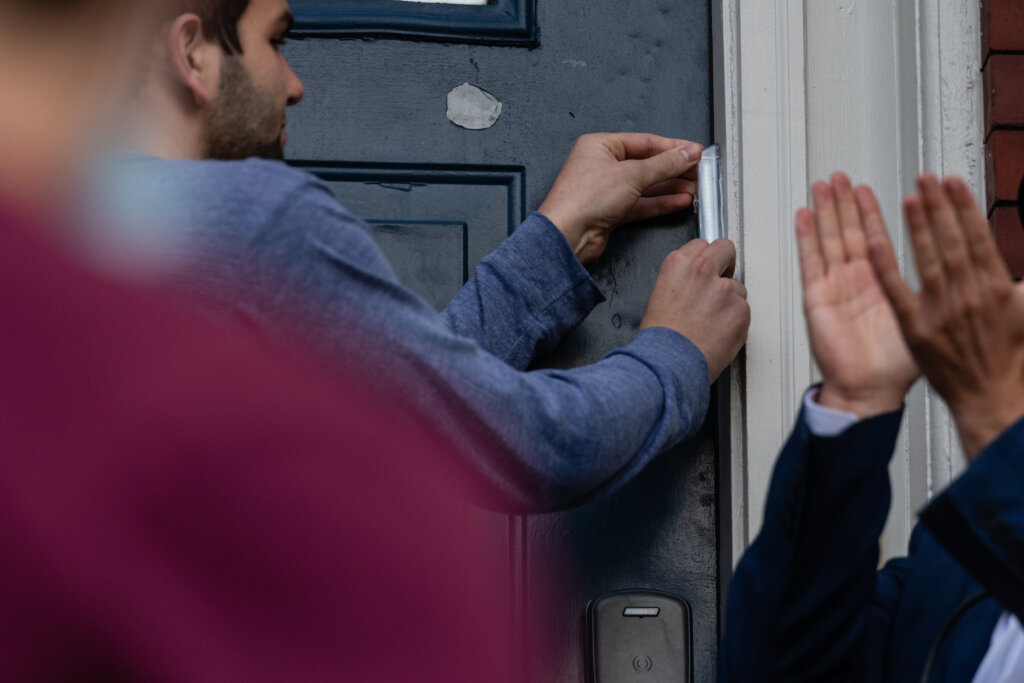
And whoever entered the house the night before Halloween damaged the Torah while throwing hot sauce all over the kitchen, ripping out smoke detectors and toppling appliances; Tau Kappa Epsilon is not a Jewish fraternity and the motive of the crime was unclear.
D.C. police closed their investigation a week later without any leads. But in certain quarters, the incident was held up as a kind of Kristallnacht on fraternity row, heralding the peril of Jews at universities nationwide. The head of the Anti-Defamation League condemned it as a “blatant act of antisemitism,” and Algemeiner, a right-leaning Jewish news outlet, called it one of the year’s “most shocking instances of campus antisemitism.”
“This isn’t Nazi Germany in 1938,” Hen Mazzig, a pro-Israel social media personality, wrote the day after the incident. “It’s American college campuses in 2021.”
Half of American Jews said in a recent survey that they believe antisemitism on college campuses has increased over the last five years. Stories of Jewish students being hounded by peers and faculty regularly make headlines, and a long roster of organizations including Hillel, Alums for Campus Fairness and the AMCHA Initiative are pouring money into protecting Jews on campus.
Just this month, the ADL released a report documenting 359 anti-Israel incidents on campuses over the past year, including a 9/11 memorial at Michigan State University being defaced to blame Jews, students waving Palestinian flags harassing students outside a Jewish fraternity at Rutgers and a student at City University of New York being called a “Zionist killer” after he asked his classmates to stop sending “anti-Israel materials” to a course group chat.
George Washington, a private liberal arts school whose location in the nation’s capital draws students who relish political debate, has been described as a “hotspot” of antisemitism and hatred toward Israel since at least the 1980s. Jewish on Campus — an affiliate of the World Jewish Congress — decried a “pattern of antisemitism” at the school last January, and the 2022 “report card” from an advocacy group called StopAntisemitism gave it a “D,” saying “Students DO NOT feel safe being open with their Jewish identity or their support for Israel.”
I spent the year since the Torah incident following the Jewish students at GW who are most involved in activism around the Israeli-Palestinian conflict, the arena where college conversations around antisemitism are most charged. I spoke at length with the leaders of GW for Israel, J Street U and Jewish Voice for Peace, attended several of their events and spoke to club members and other students during nine visits to campus.
All of these leaders acknowledged that GW has had a few clear incidents of antisemitism in recent years, including a widely circulated Snapchat video in which a female student threatened Jews. But students who support Israel also said they often anticipated hostility in the classroom or among friends that never materialized. While some reported feeling upset by floods of incendiary posts about Israel from acquaintances on social media, they also said such waves were usually fleeting.
Even those who were sympathetic to the missions of national Jewish organizations said the attention they lavish on the campus can sometimes miss the mark. Too often, they said, the spotlight bends toward histrionics, obscures positive Jewish experiences or simply overwhelms the 18-to-22-year-olds as they seek to navigate the complex politics of Israel and Jewish identity while still making it to class on time.
“All these organizations have their own agenda,” said Jessica Carr, 21, a senior and president of GW for Israel. “Even though we might agree with them — we’re all pro-Israel — they all have their own agenda and it’s not necessarily what’s best for GW.”
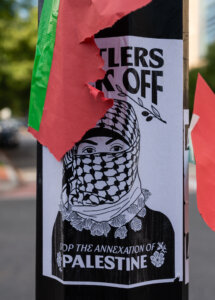
Beyond college campuses, rising antisemitism in the United States has included synagogue shootings, a rabbi taken hostage during Shabbat services, and beatings of visibly Orthodox Jews in New York. The campus incidents documented by the ADL almost never involve violence and are usually related to Israel.
Nearly a year after the Torah was vandalized, posters appeared near the GW Hillel saying “Decolonize Palestine” and “Zionists Fuck Off,” prompting another round of online outrage in which some called the early October action “vile antisemitism.” The head of the local Jewish Federation told The Jerusalem Post that he had activated a security team.
Ezra Meyer, a senior and former president of GW for Israel, thought placing the posters outside Hillel’s new building was “clearly intimidation,” yet he was skeptical that a flood of statements from Jewish groups across the country would help.
“It’s important to call it antisemitism, but I think it’s more important to let the Jewish students control the message,” Meyer said. “And to not let outside organizations hijack the stage.”
‘Wherever you go, everyone hates Israel’
Allison Stone, a junior and education director of GW for Israel, said that fear of antisemitism was a major factor in selecting a college. Stone grew up in Las Vegas, where her father chaired the local federation and she was active in the BBYO youth group. During high school, her rabbi “kept scaring me” about anti-Israel boycotts on campuses.
“‘Wherever you go, everyone hates Israel,’” she recalled the rabbi saying. “I was like, ‘That’s really scary; I better go to a school with a large Jewish community so I can fight it with them — because clearly it’s inevitable.’”
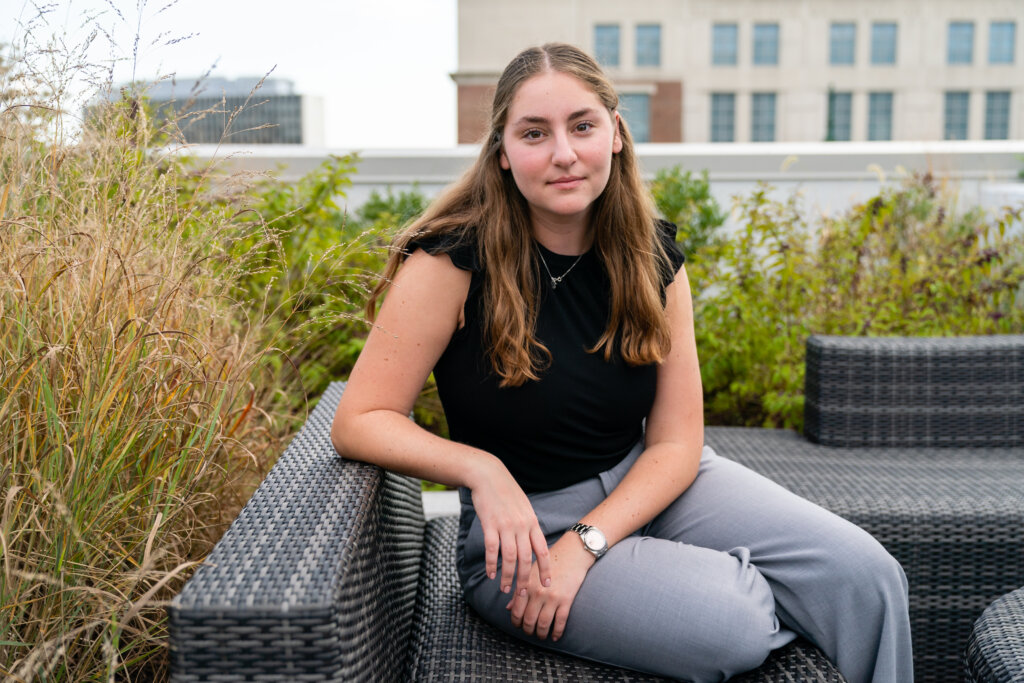
She ended up at a campus where Hillel International estimates that 27% of the 11,000 undergraduates are Jewish, making GW the nation’s fourth-most Jewish private university. But that has hardly made the school, which charges $62,000 in annual tuition, free of controversy over Israel.
In 2018, the student government passed a resolution calling on the university to boycott military contractors in Israel. The following year brought the inflammatory Snapchat video showing a female undergraduate laughing and saying, “We’re going to fucking bomb Israel bro, fuck outta of here with Jewish pieces of shit.”
The undergraduate later apologized and said she had been drunk at the time. “What I said was horrible,” she told the campus newspaper, The Hatchet. “I regret it completely.”
Shortly afterward, The New York Times published an essay by Blake Flayton, then a GW sophomore, titled “On the frontlines of progressive antisemitism.” He referenced the video, and said that he had been drummed out of left-wing circles and “branded ‘irredeemably problematic’ on GW’s campus” because of his Zionism.
Jewish news outlets tracked further flare-ups. An anthropology professor who supports an academic boycott of Israel was named interim dean of the foreign policy school in 2020. A swastika and Nazi mustache were drawn on a poster of Donald Trump and Mike Pence that an Orthodox Jewish student had hung on his dorm room door.
During the violence in Israel and Gaza in May 2021, a student sexual assault support group connected Zionism to rape and assault, and a university counseling office accused Israel of apartheid on social media — drawing condemnation from university leaders, who were then sued for discriminating against Palestinians.
“Every time an incident comes up, and we’ve had our fair share at GW, I brace myself,” said Adena Kirstein, the Hillel director, “because I’m going to get a lot of calls from outsiders saying, ‘What’s the real story? What’s going on?’”
Zionism and Judaism
The answer to that question, of course, depends on who you ask.
Sarah Frieman, a leader of GW’s chapter of Jewish Voice for Peace, said she knew that helping place the anti-Zionist posters outside Hillel would be controversial because of the way the organization mixes support for Israel with Jewish programming. But she said that avoiding the building would not have appeased critics.
“Even when organizers try to maybe cater to avoid being called antisemitic, it still occurs,” said Frieman, a senior, whose club is affiliated with the national anti-Zionist organization. “It comes to a point where people lose respect for drawing that line.”
Meyer, the former GW for Israel leader, said that was disingenuous. “If they are creating a divide between Judaism and Zionism,” he said, “then why do they feel the need to automatically associate the Jewish center on campus with Zionism?”
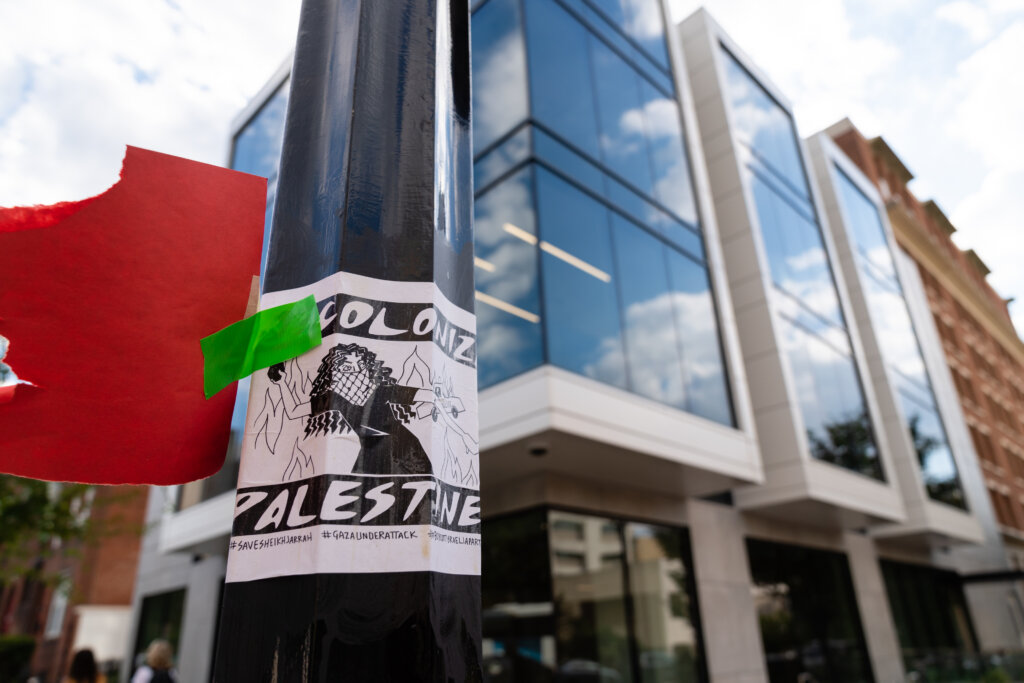
GW Hillel opened a new building last year on a corner in the heart of campus that does not prominently feature support for Israel. Carr, the Israel club president, had to hunt in a basement storage area to find an Israeli flag when I visited with a photographer. The only political sign in the building’s ground floor windows is about abortion rights.
Inside, a wall calendar shows Shabbat dinners, holiday services and classes with a staff rabbi, as well as Israel programs. Hillel hosted at least eight Israel-related events in September alone, including a visit from AIPAC and a Birthright reunion. Last week, there was a talk by a former IDF intelligence officer, which sparked a protest outside the building, where about 15 people, including Jewish Voice for Peace members, chanted slogans including “no peace on stolen land” and “long live Palestine.”
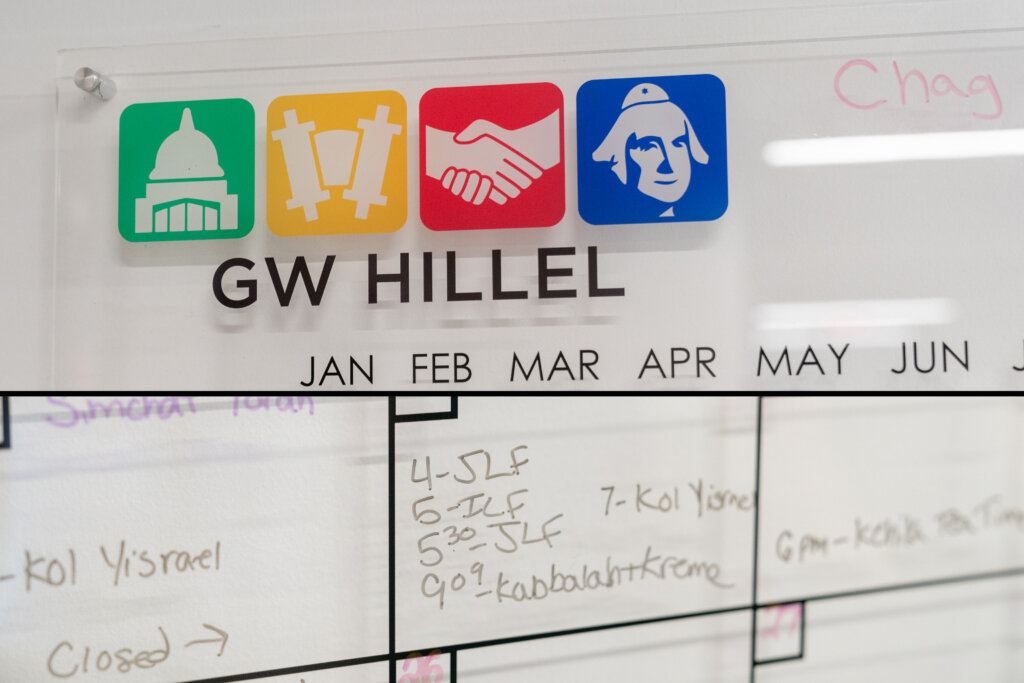
Hillel International requires its affiliates to ban speakers and organizations — like Jewish Voice for Peace — that boycott Israel or oppose Zionism. While 18-to-24-year-olds are the segment of American Jews most critical of Israel, many still see a connection to the country as an integral part of their identity.
“Zionism is a part of Jewish identity for 99% of students in the world,” Carr said.
Frieman and Rachel Krumholz, her housemate and another JVP leader, dispute those numbers, although they agree that most of GW’s Jewish students do not share their anti-Zionist views. They argued that many Jews who go to Hillel don’t share its positions on Israel either.
Their group, which started at GW five years ago, is small but growing. About 70 students signed up at the club fair last year, up from five before the pandemic. GW Hillel said 1,000 students participated in its programs last year, and that nearly 300 regularly attended events, while GW for Israel averages 150 members each year.
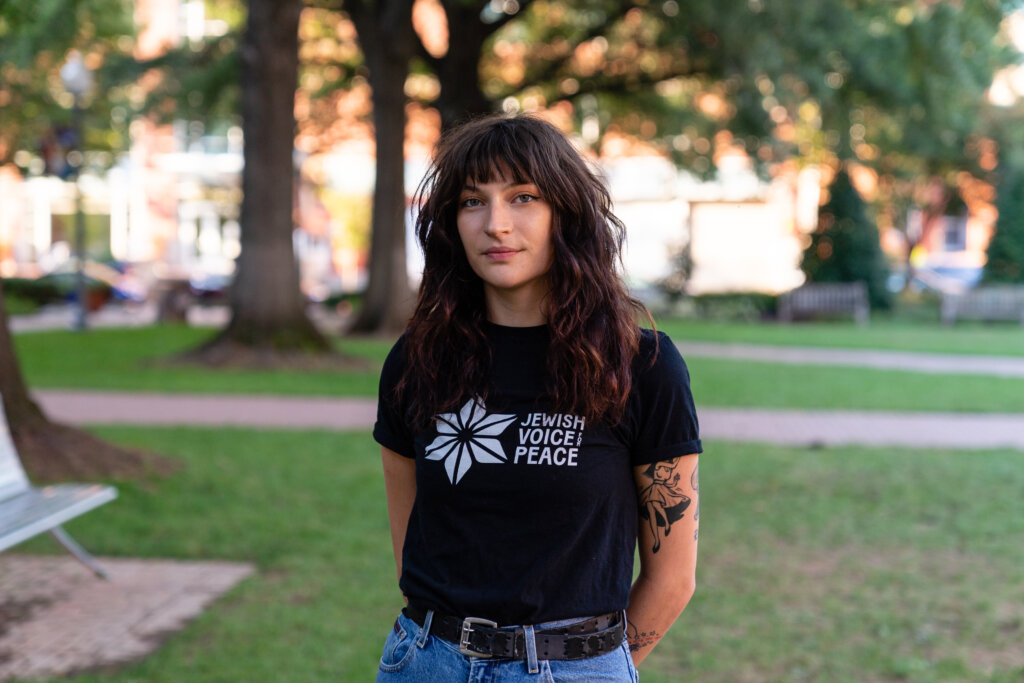
Krumholz, who grew up with Frieman in a Chicago suburb, distilled the friction: Many Jews on campus, including those who run Hillel, view her organization’s fundamental opposition to a Jewish state in Israel as an affront.
“Our tactics and the way we organize is based upon our — not just belief, but knowledge — that Judaism is not Zionism,” she said. “And their responses are always going to be based on their belief that Zionism is Judaism.”
Clashes and quiet
The protest outside Hillel last week was another case that sparked more drama online than on campus. The talk, by a little-known former Israeli intelligence commander named Doron Tenne, drew 30 people; outside, half that number — including Frieman, Krumholz and at least three other Jewish students — stood with a Palestinian flag, bullhorns and a banner accusing GW for Israel of hosting a war criminal.
“There is only one solution,” they chanted. “Intifada, revolution!”
GW for Israel, which had not responded to the anti-Zionist posters that surfaced the week before, issued a statement that called the protest antisemitic and pointed out that the term “intifada,” Arabic for uprising, generally refers to periods of Palestinian resistance in which suicide bombers and other militants have killed Israeli civilians.
Carr, the club president, said her hand was forced after national organizations condemned the protest. While Jewish on Campus created a post about the incident without speaking to her organization, she said, the Israel on Campus Coalition helped GW for Israel draft its statement, an example of the way outside groups can both frustrate and support students.
“I don’t want to sound unappreciative,” Carr said of national organizations that weigh in on campus incidents. “It can be overwhelming — but also really helpful.”
Students for Justice in Palestine responded by defending Palestinian liberation “by any means necessary,” while Jewish Voice for Peace criticized a separate statement by GW Hillel for depicting the protest as aimed at Jewish students rather than Israel.
Yet most Israel-related activities on campus are less confrontational. Take Israel Fest, when about 100 people gathered at Kogan Plaza in April for pita and hummus from a local restaurant. The club handed out “Young & Wild & Zionist” tote bags.
Carr said the goal was to “normalize Israel on campus.” It came a week after Jewish Voice for Peace had co-sponsored Israeli Apartheid Week, and a clocktower in the center of the plaza still bore the remnants of a profane anti-Zionist poster.
GW for Israel had largely ignored Apartheid Week, and while organizers of Israel Fest prepared themselves for protesters, none showed up. Nor did they see any snide comments about the event on social media, as in past years.
Examining the ‘climate’
Flayton, the George Washington alum whose 2018 New York Times op-ed helped make the campus an icon of antisemitism in some quarters, announced in August that he was making aliyah because of what he described as a growing hostility to Israel at universities nationwide. He said the impetus wasn’t “one particular moment, but a collection,” citing incidents at 21 campuses over the last three years.
Fueling his own decision and those of other young people moving to Israel, Flayton said, was the cumulative impact of the threatening Snapchat video at GW, a group of University of Chicago students who told their peers not to take “sh*tty Zionist classes” and a rock thrown against a glass door at the University of Southern California Hillel.
“In college, for the first time, I began to feel the way Jews have often felt in other times and places: like The Other,” he wrote.
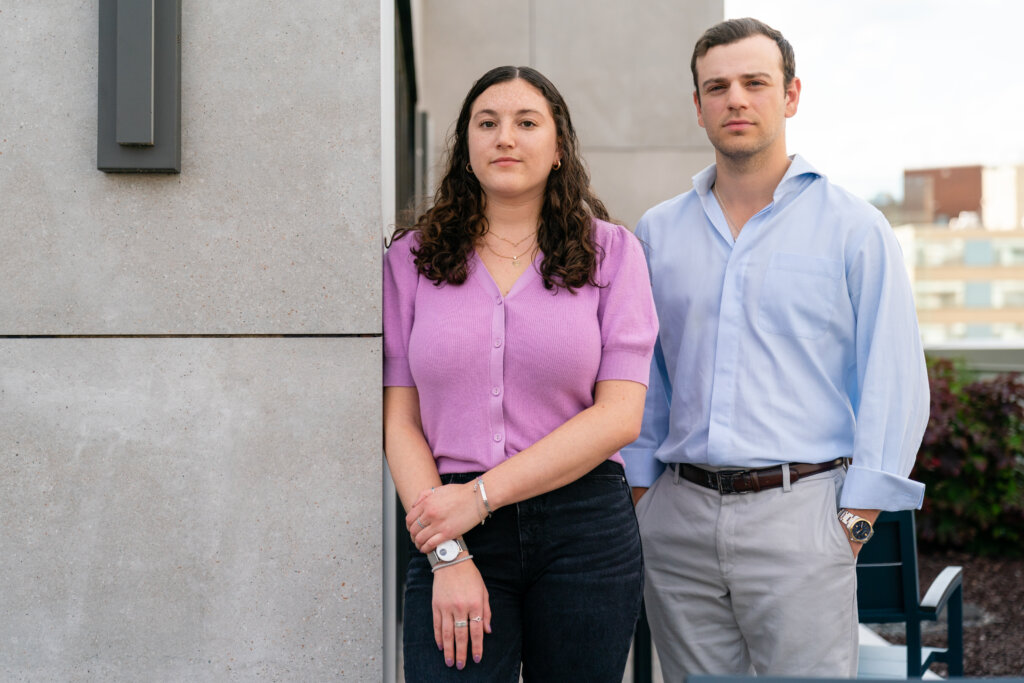
Many national organizations have sprung into action to address the situation Flayton described. Hillel is working with dozens of university administrators, including George Washington’s, on its Campus Climate Initiative to help Jewish and pro-Israel students. The Academic Engagement Network, Alums for Campus Fairness, Jewish on Campus, Israel on Campus Coalition, Students Supporting Israel and the AMCHA Initiative, among others, all have similar missions; most were founded during the last 10 years.
Dov Factor, a sophomore active in GW for Israel, opened an event last January billed as a discussion of “the climate on campus surrounding Israel” by questioning its premise. “Having an event called ‘What is the climate surrounding Israel on campus?’ kind of assumes outright that there is a climate surrounding Israel on campus,” Factor said. “But I want to challenge that.”
Had members of the club felt alienated over their Jewish identity or support for Israel? he asked. The answer for many of the two dozen students gathered was: not really.
A freshman in sweatpants and a Cincinnati Bengals jersey said he had seen a poll on Instagram showing that 96% of students on campus were afraid to talk about Israel for fear of offending someone. Another student said that a friend had replied to his text about attending the event with a puking emoji, but that he had shrugged it off.
“You don’t have to make it your whole personality or identity,” he said of supporting Israel.
A young woman said she had tensed up when a teaching assistant told a small group she was in to pick a divisive campus topic to discuss and her group chose Israel. “It actually wasn’t as bad as I thought,” she recalled. “It was just about, like, Iron Dome funding.”
Another student said that she was initially “very, very nervous” to take a foreign policy course on the Middle East, but that the only uncomfortable moment had come when the instructor said that he would accept either Jerusalem or Tel Aviv as Israel’s capital on a quiz. “I have so many red flags up,” she said, “but so far, so good.”
This fear of hostility that often fails to appear is not unique to GW. Sara Fredman Aeder, who works at New York University’s Bronfman Center, said she meets many students terrified of “outing” themselves as Jewish who hide their mezuzahs, Star of David necklaces and yarmulkes.
But most of these students “personally never experienced antisemitism and did not know of any antisemitic occurrences on campus,” Aeder wrote in a recent essay. “Their fear of antisemitism was informed not by their own experiences, but by what they read online and on social media.”
That doesn’t mean anti-Israel sentiment is hard to find. Meyer, the former head of GW for Israel — and now president of the campus College Republicans — said he took a comparative politics course in which the professor spent an entire class comparing Israel to apartheid South Africa.
And Carr said the Jewish state often comes up in courses that have nothing to do with the Middle East, usually unfavorably. “I’m listening for it,” she said. “But it’s almost every class I’ve taken.”
Jewish fault lines
Some of the most intense animosity faced by Jewish students who are critical of Israel, like Frieman and Krumholz, comes from other Jews.
The pair recalled wandering around campus during their freshman year trying to find the room where JVP was hosting a Shabbat meal and running into a group of students carrying a challah.
“We were like, ‘Is this JVP Shabbat?’” Frieman said, “and they looked at us —”
“— death glare,” Krumholz interjected.
“They looked at us like we were insane,” Frieman added.
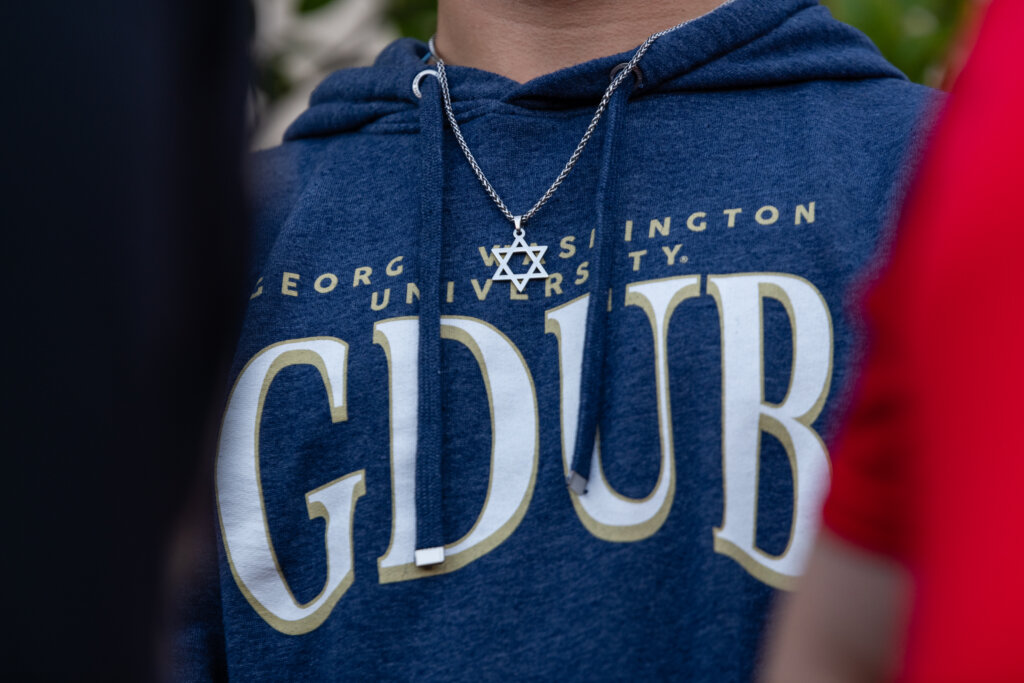
The pressure on students who support Israel and Zionism can be more subtle. When Elizabeth Irwin started at GW, she was eager to get involved in feminist activism on campus. Then she — like Flayton before her — found that many progressive groups were hostile to Israel or, like the College Democrats at the time, remained silent so they could work with organizations that supported boycotting the Jewish state.
While she was never excluded from these organizations, Irwin lost interest in participating. Instead, she spent two years in leadership roles with GW for Israel.
“I was like, ‘OK these aren’t really spaces for me,’” said Irwin, who graduated last spring. “It just changed my trajectory of what I thought I’d do in college.”
The polarized nature of Israel on campus makes it hard to find a middle ground between GW for Israel’s proud support for Zionism and Jewish Voice for Peace’s staunch opposition. J Street U tries to split the difference, but its members say they still encounter vitriol.
The group has hosted fundraisers and lectures with GW for Israel, but its politics are different; the J Street chapter criticizes the Israeli “occupation” of the West Bank, for example, while GW for Israel has called that term “misleading.”
Alicia Glassman helps run J Street U on campus and said that while many are drawn to GW for Israel for its cultural events and free food, her club better reflects most Jewish students’ politics — supportive of a Jewish state, but critical of Israel’s oppression of Palestinians.
“I would not say GW for Israel is the primary position of people — even within their organization,” Glassman said.
At a J Street U event about American military aid to Israel last fall, several members mentioned how refreshing it was to discuss the conflict without pointing fingers.
“I feel like Zionism and anti-Zionism are words that are thrown around a lot,” noted Eliana Pierotti, who taught Hebrew school during high school and is majoring in public health. “I try not to take one single difference and then use that as an excuse to not learn more.”
J Street shares a Hillel staff adviser with GW for Israel and hosts its events at the Hillel building. And Jeremy Ben-Ami, J Street’s president, last month defined the group as “Zionist” and “anti-BDS,” referring to the boycott movement against Israel. But that hasn’t stopped its members from facing the same kind of harassment that members of Jewish Voice for Peace report.
“Sometimes the line is just drawn so fast,” said Hyatt Aronoff, a co-chair of the GW chapter. “People will be like, ‘J Street — you’re literally antisemitic.’ It’s like, ‘OK, what?’”
These clashes among young Jews are rarely acknowledged by outside organizations, which tend to depict a campus battle between Jews and virulent antisemites. The American Jewish Committee, for example, dubbed the flurry of social media posts and student government resolutions targeting Israel during its military campaign in Gaza last year as examples of “Jew-hate on campus.”
Students tend to see these internal divisions more clearly, and notice how they have trickled down to affect Jewish life on campus broadly.
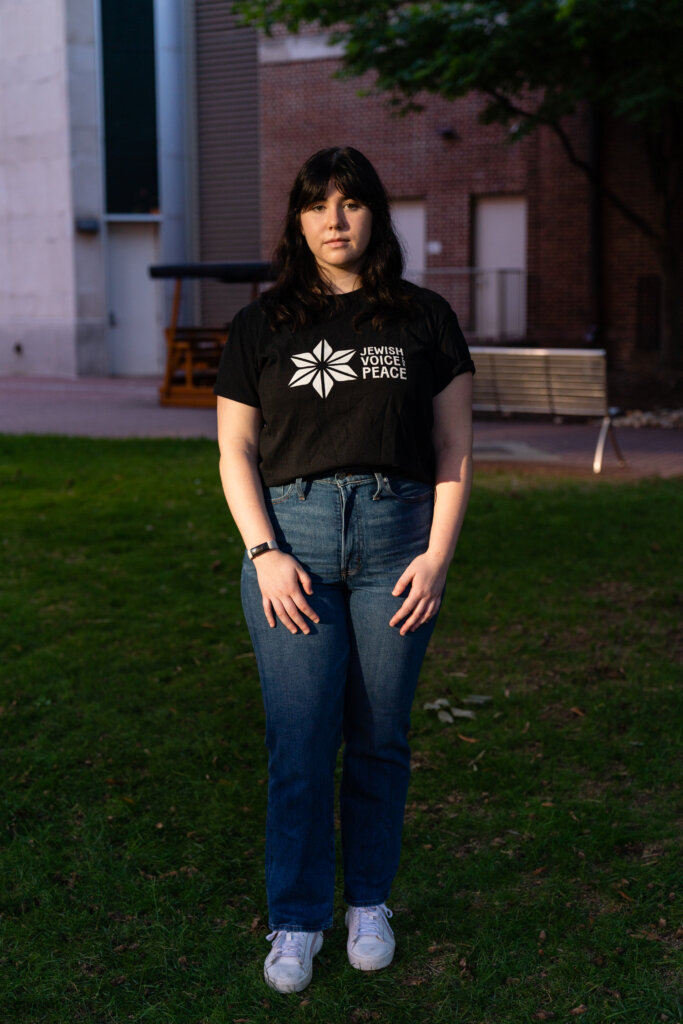
By all appearances, the vigil held following the Torah vandalism last year was an apolitical event. There were no protesters there to harangue the students carrying the replica Torah, still covered in blue liquid laundry soap. A campus rabbi hung a mezuzah at the ransacked fraternity, then another at a Jewish sorority, and nearly 500 students crowded the streets and sidewalks chanting “Am Yisrael Chai,” a popular Jewish cheer and patriotic, if charged, slogan in Israel that translates to: “the people of Israel live.”
Yet Frieman, the co-president of Jewish Voice for Peace, said her organization was shut out of the event. Years of being called an antisemite by other Jews, she added, made it hard to feel connected to the community and to emotionally process incidents like the Torah vandalism.
“I don’t ever have a sense of solidarity when those things come about,” Frieman said. “That just sucks.”
These concerns receive short shrift from the Jewish establishment. Jonathan Greenblatt, the ADL’s chief executive, mocked Jewish Voice for Peace in a May speech, and called its members extremists who embolden people to “slur” Jews, vandalize synagogues, beat up Orthodox Jews and even commit murder.
“Neither their identity nor their intent relieves them of responsibility for their actions,” Greenblatt said.
The students whom Greenblatt and other national Jewish leaders pledge to protect take a more nuanced view. GW for Israel’s leaders were critical of JVP, noting they serve non-kosher food at Shabbat dinners, and questioning whether all of the group’s members — a relatively small number, they are also quick to note — are Jewish. But they also understood that many of their Jewish peers do not share their particular brand of Zionism.
“I grew up assuming everyone who was Jewish was pro-Israel, and then I came here,” said Stone, the club’s education director. “Being Jewish here is a really large spectrum; you never really know what you’re getting.”














